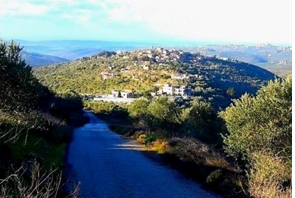Beshrail is located in the heart of a charming nature northeast of Safita on a mountain peak that exceeds 580 meters above sea level, 14 km from Safita, and on the tourist road between Safita and Mashta El-Helou district.
The village is an archaeological historical site par excellence. It is one of the oldest villages in the region, since the Phoenician era, because, as it is known, their designations of the sites where they lived began with the letter “B.”
The monuments discovered there, especially at the Rumaila site, where many relics and archaeological finds were located, indicate that it is a village inhabited for several centuries. In addition, the nature of the Phoenician designation of the village as “face of God” can be indicative of its breadth and height compared to its surroundings. It is more correct than the second meaning that others say, according to the lexicon’s analysis of the name that “Beshrail” comes from the meaning of “Annunciation” or the “Gospel,” according to the Christian religion. It is said that the meaning of “Beshrail” is the face of the god, as it was manifested in the most beautiful images.
Beshrail is characterized by a cold winter climate where snowfalls, and a mild, refreshing summer that encourages tourism and summer vacation.
There are many geographical natural sites in the village that refer to archaeological existence, such as “Hakuret al-Nagus.”
The village has popular parks like Al- Aujan, and the Al-Nattah Rock site next to Al Aujan Falls, which is a charming place where people meet together. It contains a natural cave and an archaeological mill, in addition to the “Asimiyyat” site, the House of the Agha Jaber Al-Abbas, and a watermill.
It also has Al-Mardisiyah, which is a hectare of land that is one of the most beautiful places on Earth.
Agriculture is one of the most important activities that people practice in most areas of the village, especially on the outskirts of the always-flowing “Al-Abrash” river. Olives and citrus are among the most important crops that the villagers depend on for their livelihood.
Amal Farhat

